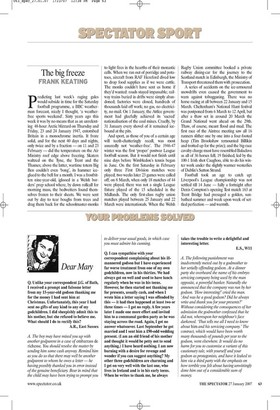The big freeze
FRANK KEATING predicting last week's raging gales would subside in time for the Saturday football programme, a BBC weatherman forecast, nicely I thought, 'a weatherfree sports weekend'. Sixty years ago this week it was by no means that as an unrelenting 48-hour Arctic blizzard on Thursday and Friday, 23 and 24 January 1947, entombed Britain in a monochrome inertia. It froze solid, and for the next 40 days and nights, only twice and by a fraction — on 11 and 23 February — did the temperature on the Air Ministry roof edge above freezing. Skaters waltzed on the Tyne, the Trent and the Thames; above the latter, wartime totem Big Ben couldn't even 'bong', its hammer iceglued to the bell for a month. I was a frostbitten nine-year-old, iglooed in a Welsh borders' prep school where, by dawn rollcall for morning mass, the bedwetters found themselves frozen to their sheets. We were sent out by day to tear boughs from trees and drag them back for the schoolmaster-monks to light fires in the hearths of their monastic cells. When we ran out of porridge and potatoes, aircraft from RAF Hereford dived low to drop food supplies as if we were cattle. The monks couldn't have sent us home if they'd wanted: roads stayed impassable; railway trains buried in drifts were simply abandoned; factories were closed, hundreds of thousands laid off work; no gas, no electricity, no mail. On 1 January, the Attlee government had gleefully achieved its 'sacred' nationalisation of the coal mines. Cruelly, by 31 January every shovel of it remained icebound at the pits.
And sport, as those of you of a certain age will teeth-chatteringly recall, was most assuredly not 'weather-free'. The 1946-47 winter was the first 'proper' postwar League football season. But it would not finish until nine days before Wimbledon's tennis began in June. On the first Saturday in February only three First Division matches were played; two weeks later 23 games were called off; on 8 March, when only 18 matches of 44 were played, there was not a single League fixture played of the 15 scheduled in the Midlands. The only first-class rugby union matches played between 25 January and 22 March were internationals. When the Welsh Rugby Union committee booked a private railway dining-car for the journey to the Scotland match in Edinburgh, the Ministry of Transport threatened them with prosecution.
A series of accidents on the ice-armoured snowdrifts even caused the government to warn against tobogganing. There was no horse-racing at all between 22 January and 15 March. Cheltenham's National Hunt festival was postponed from 6 March to 12 April, but after a thaw set in around 20 March the Grand National went ahead on the 29th. Thaw, of course, meant flood and mud. The first race of the Aintree meeting saw all 16 runners slither one by one into a four-footed heap (Tim Brookshaw remounted Billikin and trotted up for the prize); and the big-race cavalry charge must have resembled Balaclava as all of 36 horses fell; 19 finished, led by the 100-1 Irish shot Caughoo, able to do his winter work under the slightly warmer westerlies of Dublin's Sutton Strand.
Football took an age to catch up: Liverpool's League championship was not settled till 14 June — fully a fortnight after Denis Compton's opening Test match 163 at Trent Bridge had presaged a golden, sunbathed summer and week upon week of settled perfection — and warmth.














































 Previous page
Previous page